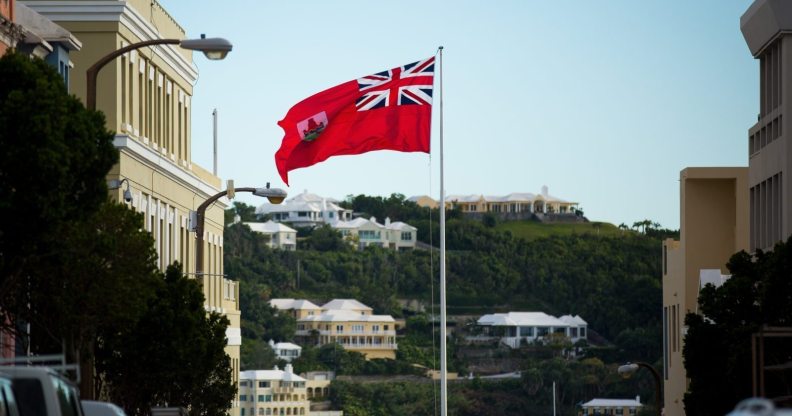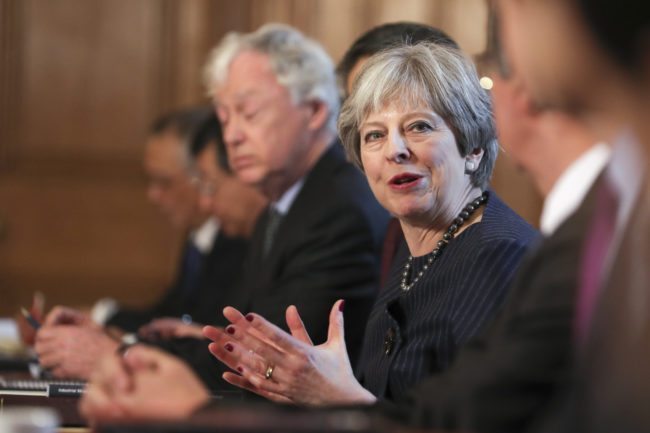The UK has neglected LGBT+ people in British Overseas Territories in their hour of need

HAMILTON, BERMUDA – NOVEMBER 8: The flag of Bermuda flies as houses dot the hillside across Hamilton Harbour, November 8, 2017 in Hamilton, Bermuda. In a series of leaks made public by the International Consortium of Investigative Journalists, the Paradise Papers shed light on the trillions of dollars that move through offshore tax havens. (Drew Angerer/Getty Images)
Little is discussed in the UK about the 14 territories still under the jurisdiction and sovereignty of the United Kingdom. Spanning the likes of the Cayman Islands through to Bermuda, these countries saw the UK criminalise homosexuality in their countries, yet it appears the country is nowhere to be seen when it comes to decriminalising the likes of same-sex marriage. In an exploration of what LGBT+ rights are like for queer people in British Overseas Territories in the Caribbean, academic Dr Leonardo Raznovich argues that the UK has abandoned the territories in LGBT+ citizens’ hour of need.
The UK has six British Overseas Territories in the Caribbean, some known for their financial services. They are the Cayman Islands, the British Virgin Islands, Bermuda, Montserrat, Anguilla and the Turks and Caicos.
Although largely self-governing territories, the UK retains constitutional power to legislate and to step-in regarding internal matters. Put simply, they remain colonies of the UK.
For example, the UK repealed their sodomy laws in 2000 against their wishes and exercised direct rule in Turks and Caicos in 2009 by deposing its government for corruption.
In fact, the UK has the legal duty to ensure that these territories are governed responsibly and comply with international law. Indeed, the UK extended the European Convention on Human Rights (ECHR) to each of them; they are bound, like the UK, to comply with it.

Grand Cayman, Cayman Islands. (Photo by David Rogers/Getty Images)
Nonetheless, these territories have laws and policies that discriminate against LGBTI people, in breach of the European Court of Human Rights.
In August 2015, politicians in the Cayman Islands government incited violence and sexual hatred against LGBTI people, avoiding prosecution through parliamentary privileges.
Statements in the local legislature included describing homosexuality as a ‘deviant behavior’, ‘wicked and immoral’ and a ‘social and moral evil’, threatening violence towards homosexuals and making remarks that equated homosexuality with bestiality and paedophilia, including suggestions that ‘crushing a baby’s skull and sucking their brains out had become a human right’.
In September 2016, Colours Cayman, a LGBTI organisation, petitioned the UK government regarding these breaches, pleading for assistance. The UK government refused to act regardless of its constitutional powers to do so.
in July and October 2017, the Immigration Authority of the Cayman Islands refused to apply its own precedent set in July 2016 – in which it needed to establish rights for the same-sex spouse of a foreign worker to reside in the Cayman Islands as a dependant – to benefit LGBTI Caymanians. This decision, in effect, expels LGBTI Caymanians from their own country, leaving them with just one option: to live overseas as a family unit, against basic principles of equality and natural justice.
“Although the UK has the legal power to stop these breaches, it persistently does nothing”
In Bermuda in May 2017, the Supreme Court of Bermuda established marriage equality for same-sex couples.
The Bermudian Government did not appeal but, contrary to this judgment, passed a bill to cancel the judgment, withdrawing the right to marry for same-sex couples and implementing a ‘domestic partnership’.
Such withdrawal of an established legal right is unique in modern times. The UK government has the power to stop this madness by instructing the Governor of Bermuda, whom the UK appoints, to withhold assent to the bill.
The situation in Bermuda is more disturbing: if the Bermudan Governor, appointed by the UK, is instructed by the UK Government to give assent to the Bill the UK is no longer a passive bystander.
The breaches of the ECHR in the Cayman Islands call into question the UK’s respect for human rights.
Although the UK has the legal power to stop those breaches, it persistently does nothing.
This failure to act stands in stark contrast to the attitude taken by the US, France and the Netherlands, each of which secures equality for all LGBTI people throughout their dependant Caribbean territories.
The UK becomes an active accomplice: it will be actively engaged with the Bermudan Government in undermining the rule of law, by ignoring an order of the local court, and it will be facilitating the withdrawal of equality, by taking away legally established rights (i.e. access to marriage) from a section of the population based purely on sexual orientation.
To be clear, the UK, as the sovereign power, is ultimately responsible for good governance in its overseas territories.

Prime Minister Theresa May has not intervened in Bermuda’s repeal of same-sex marital rights (Photo by Daniel Leal-Olivas – WPA Pool/Getty Images)
Is it good governance to take away legally established rights for same-sex couples under Bermudian law?
Let us pause before answering and think further: what if, instead of taking away the right to marry and implementing a domestic partnership framework for same-sex couples, the Bermudan Government were to do this for non-Christian couples, or interracial couples?
Would the UK government consider it good governance to permit such a legislative change too? I doubt it. Why then are Bermudian same-sex couples less worthy of equality in the eyes of the UK Government?
This Bill cannot become law without the UK’s endorsement.
Before instructing the Governor to give assent, the UK Government must, at the very least, afford respect and dignity to its LGBTI citizens and articulate why, as individuals, those LGBTI citizens are less worthy of equality.
Failing this, what message does this send for LGBTI people in other British Overseas Territories, such as the Cayman Islands?
The answer: you can fight for, and secure, equality under local law, but the UK government will support the taking away of that right in defiance of the rule of law.

